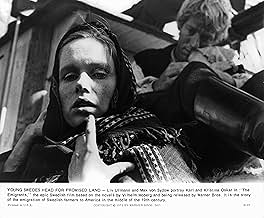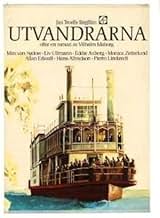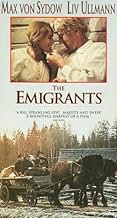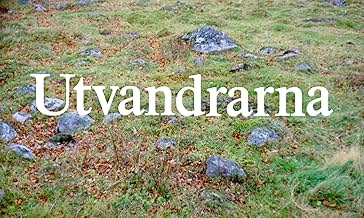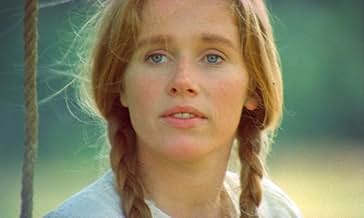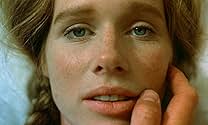Una familia de granjeros lucha por seguir adelante en una tierra rocosa y difícil, en la Småland (Suecia) de mediados del siglo XIX, hasta que decide embarcarse en un peligroso viaje hacia A... Leer todoUna familia de granjeros lucha por seguir adelante en una tierra rocosa y difícil, en la Småland (Suecia) de mediados del siglo XIX, hasta que decide embarcarse en un peligroso viaje hacia América.Una familia de granjeros lucha por seguir adelante en una tierra rocosa y difícil, en la Småland (Suecia) de mediados del siglo XIX, hasta que decide embarcarse en un peligroso viaje hacia América.
- Dirección
- Guionistas
- Elenco
- Nominado a 5 premios Óscar
- 8 premios ganados y 11 nominaciones en total
- Nils
- (as Svenolof Bern)
- Dirección
- Guionistas
- Todo el elenco y el equipo
- Producción, taquilla y más en IMDbPro
Opiniones destacadas
The characters, played by Ingmar Bergman regulars Max von Sydow, Liv Ullmann and Allan Edwall, face poor harvests, starvation, poverty, religious persecution and even false rumours of bestiality. They look to the US as a place where a farmer can become rich, with even American slavery looking better than their previous situation. Getting to North America, however, will take a rough voyage in which our heroes will face disease, lice and death, and come into psychological conflict with each other. This makes for a strong drama.
Surely one of the best foreign films of the 1970s and a great addition to the strong cinematic year 1971, The Emigrants is an understated but still compelling film, and I look forward to The Criterion Collection's restoration.
The first part of the film details the challenges these people face that make them want to emigrate in the first place. An oppressive village hierarchy in which all laws and rules of accepted behavior are arbitrated by a self-appointed few, as well as conditions that make farming a constant struggle, leave them craving the freedoms and fertility of the mythic U.S. The second part of the film is a meticulous recreation of what the actual journey was like, including a long segment about the miseries of crossing the Atlantic Ocean (including sea sickness and lice), and the interminable trek up the Mississippi River to Minnesota once they landed. It's almost impossible to wrap your head around how frightening this entire experience would have been for them. These people knew almost nothing about the world outside of their small Swedish village (one young man doesn't even know how the ocean works and thinks they're all going to drown if the water rises) and trust themselves to strangers who don't speak their language or really have any reason to look out for their interests. It's a fascinating film and feels more like a documentary than a fictional narrative.
Unfortunately, the only version I was able to see was the dubbed one shown by TCM. I would have much preferred to see it subtitled so that I could experience von Sydow's and Ullmann's performances as they were meant to be experienced.
"The Emigrants" was nominated for Best Foreign Language Film at the 1971 Academy Awards, and then because of Oscar's weird eligibility rules popped up again a year later with four nominations, for Best Picture, Best Director (Jan Troell), Best Actress (Ullmann), and Best Adapted Screenplay. At the time, it was only the third foreign language film after "Grand Illusion" and "Z" to receive a Best Picture nomination. And the film's sequel, "The New Land," was up for Best Foreign Language Film the same year that "The Emigrants" was in the Best Picture race. Good couple of years for director Jan Troell.
Grade: A
Few of the characters believe the streets of America are paved with gold. Instead, The Emigrants is a brutally realistic take about struggling and seeing no future in one's homeland and deciding to risk everything in order to have a shot at a better future. The movie is neither cliche nor cynical about the "American Dream." It makes its social points through contrasts and juxtaposition. We see the wealthy Americans aboard a steamboat interspersed with jarring shots of chained slaves below. There also are incredible moments of wonder, like the elderly Swedish woman seeing a steam engine approach for the first time in her life.
The film is an honest and moving portrait about one group of Swedish expats seeking opportunity, whether financial or religious. Perhaps most of all, the movie captures the sense of home and of homelessness for the characters. The chemistry between von Sydow and Ullmann is incredible. Husband and wife, they say they are best friends, and it shows. It's powerful acting.
I would give this film a 9/10, but for the editing. At least a half hour of this film could have been left on the cutting-room floor, particularly in the first half. You could walk away for several minutes and miss nothing. Otherwise, The Emigrants definitely worth seeing.
There are lots of little touches in the film, such as the family's reaction to being on a train for the first time, reminding us that railroads were a monumental innovation in the 19th century. The priest who is with them along with his followers because they were persecuted in Sweden doles out some sublime thoughts, such as reminding them that even lice are god's creation and that suffering because of them allows one to understand suffering in others better and to empathize. He also dispenses a lot of nonsense, such as the idea that they'll magically understand English when they land in America per his understanding of the Bible, and in general trying to attribute everything that happens in their little lives to divine favor or displeasure operating on them in ways he's always trying to explain after the fact.
The family is incredibly naïve about planning beyond the idea of 'going to America', and their rosy optimism of all the wonderful things they would find there. It's interesting that on the one hand they find a fellow Swede in Minnesota living in what his mother sees as squalor, but on the other hand, that they're free to stake out claims to beautiful, arable land, which is hard to fathom today. They are in some sense disillusioned, but in another sense, are in a paradise of sorts. There are lots of moments where fantasy and reality meet in the film, but it's in nuanced ways and never overplayed.
It's a fantastic moment when we get a brief glimpse of slaves in chains on a steamboat, and in those poor eyes get a heartstopping reminder that to others, coming to America was a very different, horrifying nightmare of an experience. So much for the idea that the young men had read about in Sweden, that "many of the slaves have better houses, food, and circumstances than peasants in Europe." Unfortunately while we might see a few Native Americans at one of the stops, the idea that the land these people from Sweden are claiming had been inhabited by people who were going through genocide is not articulated by the film, though it is in the sequel, 'The New Land.'
In terms of production value, there is a lot to love about the realism. We're not flooded with grand images of landscapes, and even the beauty we see in the woods or fields has a natural ruggedness to it. It's a very small moment, but at one point director Jan Troell gives us the sun on the water during a very serene moment with slow undulations, which I found simply exquisite, and such a contrast to the harshness of the ocean journey. The performances from Max von Sydow, Liv Ullmann, and the rest of the fine cast are unaffected and natural. The version I saw had unfortunately been dubbed in English though, and I think seeing it in Swedish with English subtitles would have been infinitely preferable, and much more in keeping with the spirit of the film, so if it's an option for you, I would certainly seek it out.
¿Sabías que…?
- TriviaWhen filming the scene towards the end, where Karl Oskar walks off to find a better place for his settlement, director Jan Troell forgot to yell, "Cut." Max von Sydow just kept walking and walking, waiting for a "cut", and nobody realized until they took lunch.
- ErroresOn the train west a character shows an American silver coin and yells out it has "In God We Trust" on it. The scene is the 1850s and the motto was not added to American silver coins until 1867.
- Citas
Arvid: What do you think it will cost to ship us there?
Robert: Around 200 riksdaler.
Arvid: Ya, well, might as well forget it. 200 riksdaler. I'll never have that much.
Robert: You don't have it?
Arvid: I will go anyway. We can travel to America on foot.
Robert: Nah, there's an ocean. You can't go on foot to America.
Arvid: Do you mean there is no way?
Robert: I'm afraid there is not. America is an island.
Arvid: Damned ocean.
- Versiones alternativasThe USA television version, retitled "The Emigrant Saga", consists of this film plus its sequel, Nybyggarna (1972), joined and re-edited together in chronological order and dubbed in English.
- ConexionesEdited into Spisok korabley (2008)
Selecciones populares
- How long is The Emigrants?Con tecnología de Alexa
Detalles
Taquilla
- Total en EE. UU. y Canadá
- USD 1,156,554
Contribuir a esta página


